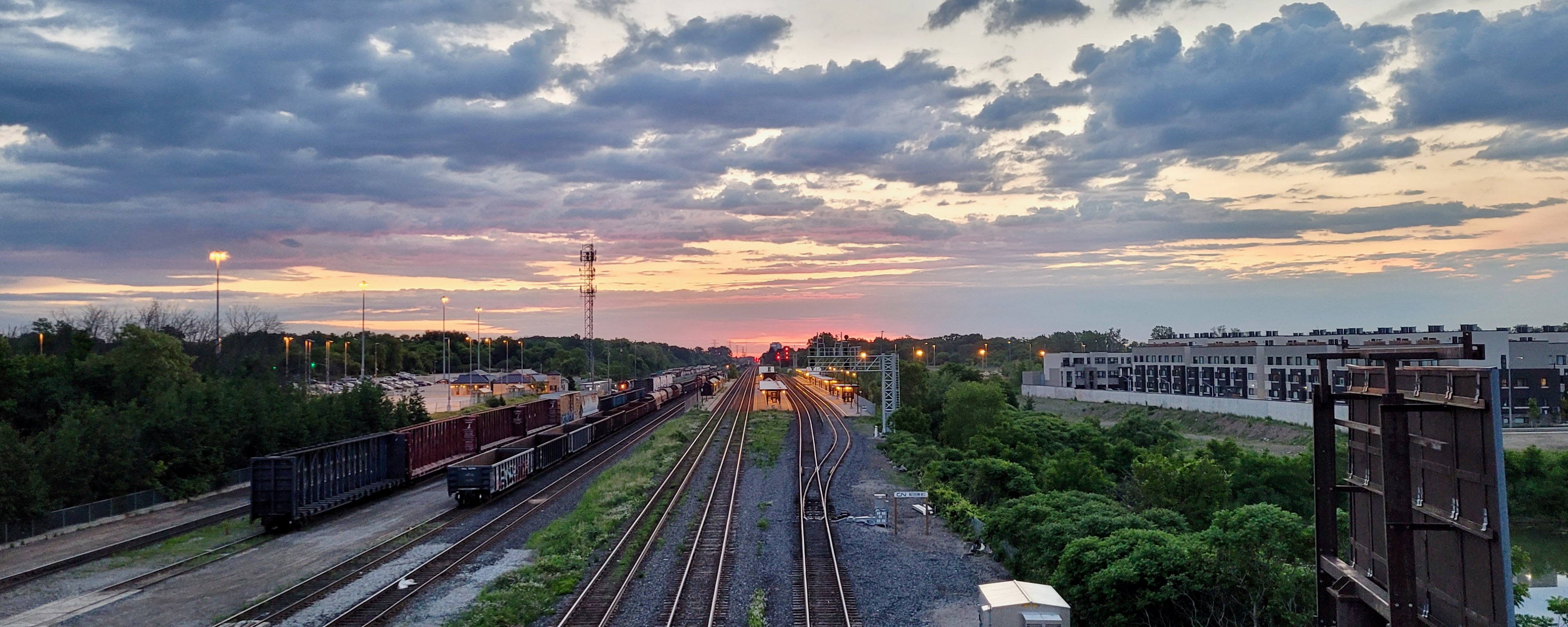From Metrolinx News blog
By Rosie Hales-Wilson, Metrolinx senior communications advisor
Now complete, Aldershot GO’s new pocket track connection may only be 200 metres long, but it will go a long way in achieving one of Metrolinx’s top priorities: opening up more GO service to Hamilton. Read on to learn more about how the track was tested, and why it will eventually mean more service.
Work to add a new piece of track at Aldershot GO is now complete. But this isn’t just any track – it’s a piece of track that is the key to improving service to Hamilton and beyond.
This new piece of track is only about 200 metres long, but it’s well on its way to making a big impact. It connects the pocket track at Aldershot GO to the main Lakeshore West Line via a track section called a turnout and a switch mechanism (which allow a train to be guided from one track to another).
Typically, pocket tracks are installed so that trains can be taken off the main tracks, if needed. They usually don’t connect to the main line, but that’s where this pocket track is different.
Unlike most pocket tracks, the track at Aldershot GO has been connected back to the main line to support increased service to West Harbour GO in Hamilton in the future.

Why one piece of track means more service
Prior to this work being completed, the southernmost track at Aldershot GO had a “stub end,” which meant that trains on this track couldn’t go any further than Aldershot because there was no connection from this track to the main Lakeshore West line.
Essentially, the connecting of the two tracks gives the south track the option of going westbound into Hamilton, which was not possible before. The connection of this track to the main line has created more opportunities to increase service west of Aldershot in the future. The finished track was recently commissioned, which means it has been tested and is now ready for use.
Commissioning involves a lot of behind-the-scenes work between Metrolinx’s rail operations team and CN Rail (who own the tracks west of Burlington) to ensure the safety of the new tracks before use.
What exactly is commissioning?
Commissioning requires a quiet track, which means this work needed to take place late at night, after the last train on Track 3 had left Aldershot GO for the day.
Commissioning the track late at night ensures that there is less impact to train service.
The new signal at Aldershot GO was connected and tested multiple times throughout the night, to mimic as many different conditions as possible to ensure the track is safe in any number of situations.
To keep the process as safe and efficient as possible, actual trains are not used for commissioning tracks. It’s much safer to employ small shunts that can be used in connection with a software system to imitate the physical condition on the track, as opposed to maneuvering trains multiple times. The shunts’ software reads how the shunting (or, in real life, the train) impacts the signal system.


What work happened at Aldershot?
Back when work on this project started in November 2021, the pocket track that serves the southernmost platform at Aldershot GO had a stub end. This meant that trains on this track needed to end service at Aldershot, as there was no connection from this track to the main Lakeshore West tracks.

When the track had a stub-end, bump posts indicated the end of the track.
Now, red-brown attachments called half-moons are the temporary measure used to indicate the end of the track.
When the pocket track connection goes into use, the half-moons will be removed to open up the rest of the Lakeshore West Line.

Opening up service to Hamilton and beyond
This new track at Aldershot GO is just one example of many investments Metrolinx’s GO Expansion program has already made on the Lakeshore West Line to enable more rail service.
Metrolinx is also building towards enhanced track capacity and working with rail partners to bring service to the future Confederation GO Station.
Over the next few years, there are plans to tie-in the two stub-ended tracks currently at West Harbour GO, connecting the tracks to the main Lakeshore West Line on the east side of the station.
This work will eliminate the need to reverse GO Trains past the station to line up again with the main line, which adds 20 minutes to trips when travelling to and from Niagara and will facilitate service to Confederation GO and beyond.




